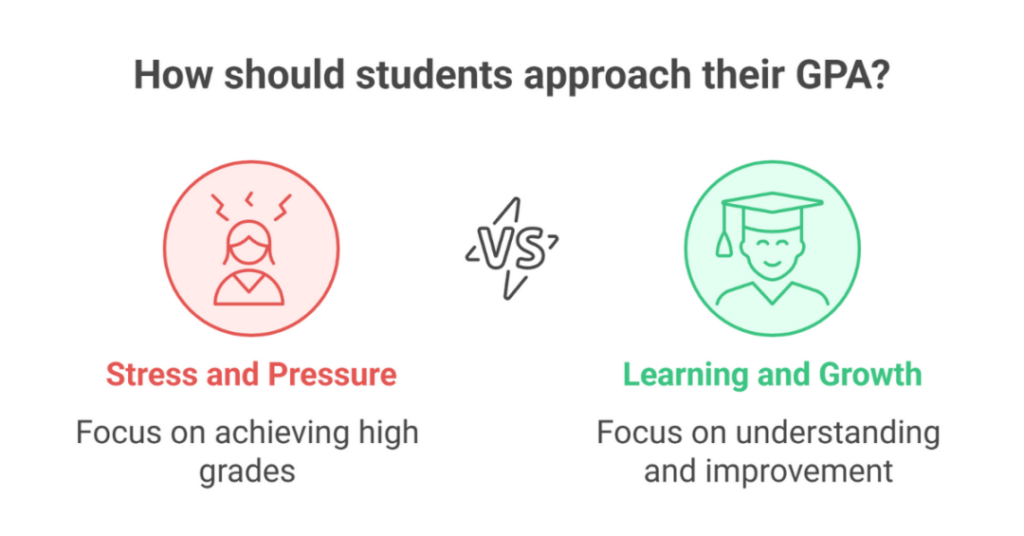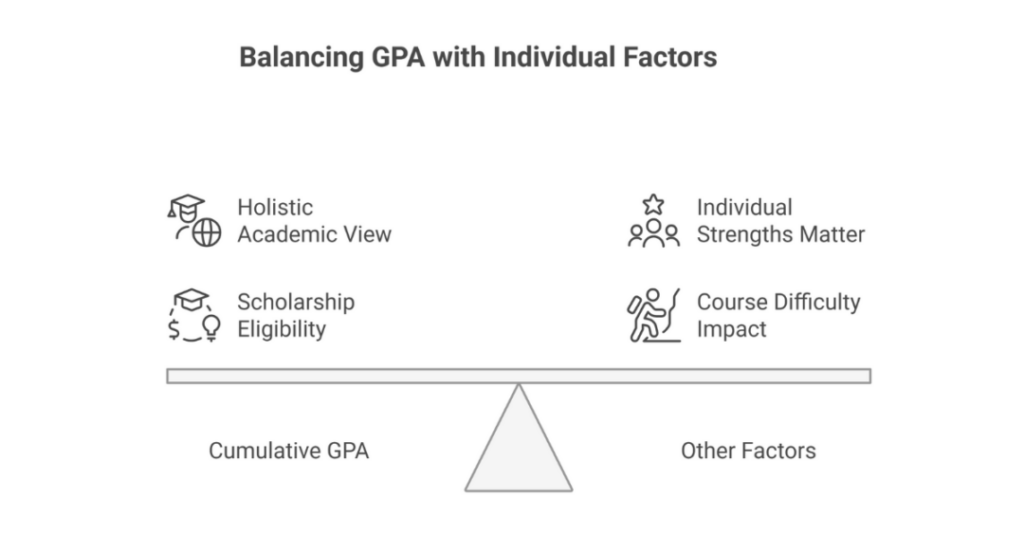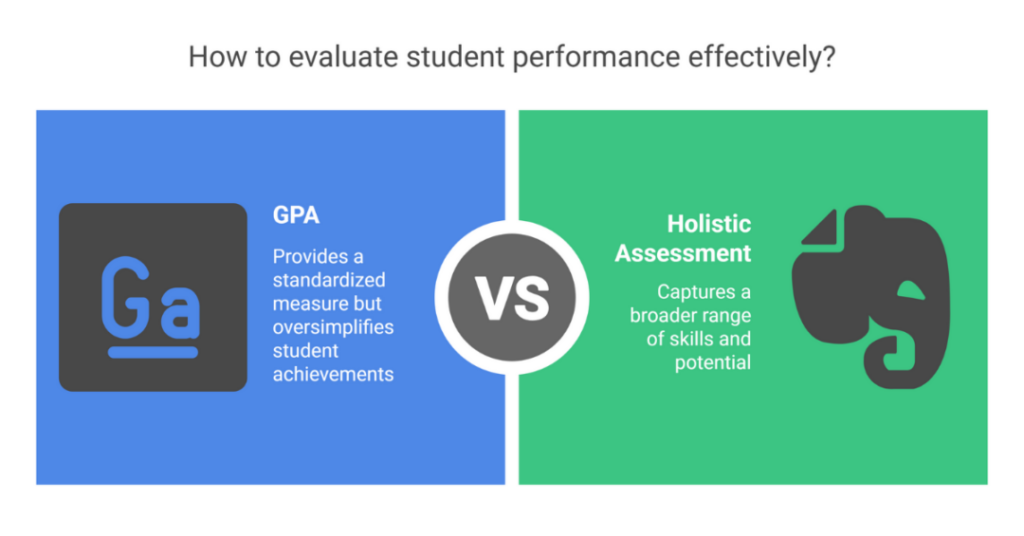27 June 2025
7 minutes read
GPA Full Form: Full Form of GPA and Essential Tips for Indian Students

Key Takeaways
- GPA full form is Grade Point Average, and it helps universities assess your overall academic performance across semesters.
- GPA full form plays a crucial role in study abroad applications, as it reflects consistency and capability in academic subjects.
- GPA full form is often required alongside standardized test scores like IELTS, TOEFL, GRE, or SAT for admission into top international universities.
Do you know that your GPA, or the Grade-Point Average, can contribute significantly to your academic and professional life?
It is not a mere figure; it indicates your effort and improvement over time. But numerous students tend to get bogged down by the fear of maintaining a high GPA, dreading it could make or destroy their future.
But here’s the thing: while GPA is important, it’s not everything about you. Rather than worrying about every grade, concern yourself with learning and development.
It is acceptable to ask for assistance and look for methods of improvement. Keep in mind, a balanced strategy towards study can result in improved outcomes and a pleasant experience.
What is GPA Full Form in Education?
In school, the actual meaning of GPA is Grade-Point Average, an average measure of academic achievement. In simple terms, GPA is the mean of all your grades, translated into a scale, usually from 0 to 4.0 or 5.0. It gives an instant picture of your grade performance overall.

There are two general types of GPA: unweighted and weighted. An unweighted GPA is equal in its treatment of all courses, whereas a weighted GPA provides extra points for tougher courses, such as honors or AP classes.
If you are looking to get into top universities, where IELTS, TOEFL, GRE, GMAT and SAT tests matter, it is best to give the heavy lifting to GPA evaluation services.
Knowing GPA requirements is important, particularly when striving for certain academic achievements or institutions. Colleges tend to have minimum GPAs that must be met, so it is vital to know where your GPA stands in comparison to your intentions.
Whether it is the unweighted GPA that indicates your raw academic ability or the weighted GPA that indicates the rigor of your coursework, having a sense of where you stand can assist you in planning your academic career more optimally.
What Does the Full Form of GPA (Cumulative GPA) Stand For?
Cumulative GPA, or Cumulative Grade-Point Average, is an all-encompassing indicator of a student’s performance in all completed courses.
Term or semester GPA only captures grades for a particular time frame, whereas cumulative-GPA aggregates all grades that have been accumulated over time, reflecting a complete picture of a student’s academic progress.
The cumulative GPA is calculated by the total hours attempted, yielding a weighted measure of a student’s accomplishments.
In schools, a good cumulative GPA is usually the prime consideration in gaining qualification for scholarships, honors programs, and admissions, particularly for advanced secondary education such as applying for a master’s program.
It’s also one key metric utilized by education institutions to evaluate a student’s potential.
However, it’s important to note that while a high GPA can open doors, it is not the sole indicator of a student’s abilities or potential. The grading system, course difficulty, and individual strengths all play a role in shaping a student’s academic profile.
How are GPAs Calculated?
GPA, or Grade-Point Average, is done by converting your grades to a numeric score on a GPA scale, usually between 0.0 and 4.0. Every letter grade that you achieve in your classes, for instance, A, B, C, and so on, has a predetermined point value assigned to it.
For instance, an ‘A’ may be equated to 4.0, a ‘B’ to 3.0, and so forth. The GPA is then calculated by dividing the total grade-points accumulated by the number of credit hours completed. For higher education purposes, like masters in USA, you can use specific ones like a GPA calculator for MS in USA.
This calculation gives you a standardized gauge of academic achievement, which is important in college admissions and assessing student performance. As an example, a 1.0 GPA reflects lower educational performance, whereas a 4.0 GPA is outstanding.
Knowing how your GPA is calculated will enable you to plan your academic activities and aim for your preferred academic objectives.
What’s a Good GPA or Grade Point Average?
A favorable Grade-Point Average (GPA) would range around 3.0 to 4.0 on a scale of 4.0, depending on your aspirations. GPAs higher than 3.0 are usually preferred in the context of college entry and scholarship.
Nevertheless, a “good” GPA can also depend on the number of credit hours one has worked for and the course difficulty level (like a 3.69 GPA). A high GPA can make you shine in competitive courses and get you into other opportunities.
An average GPA also can open many doors for you with the right selection of courses and colleges.
How does GPA work?
GPA, or Grade-Point Average, is a standardized system for measuring study performance. It translates letter grades into values on a scale, often between 0.0 and 4.0, to indicate a student’s performance.
There are other forms of GPA present as well, like a 7 point and a 20 point GPA. Although GPA does consider the difficulty of courses, it at times discourages students who perform well in harder classes but fail to have their hard work mirrored in a high GPA.
This may affect decisions regarding admitting students into selective programs since GPA is usually a primary factor for admissions and scholarships.
How to Convert Overall GPA into Percentage (GPA Calculator)?
To get a percentage out of GPA, you’ll first have to know how your school uses the grading scale. In most schools, 4.0 GPA is equal to 100%. To get the percentage, divide your GPA by the high point GPA (for example, 4.0) and then multiply by 100.
For example, 3.5 GPA on a scale of 4.0 would be about 87.5%.

This conversion is useful in processes during the interview and when assessing qualifications suitable for a vocation.
While the grading system has lessened the pressure of ranking by standardizing assessments, converting CGPA to a percentage can provide a clearer picture of academic performance in contexts where percentage scores are more commonly understood.
What are the Benefits of GPA?
Understanding the benefits of GPA (Grade-Point Average) is crucial for students navigating their academic and career paths. Here are some key points highlighting its importance:
- Used in Many Active Learning Institutions: GPA is a standard measure used globally, providing a consistent way to assess and compare student performance. You can use a GPA to CGPA calculator for such services.
- GPA in Order: GPA helps in ranking students in order, which is crucial for determining eligibility for scholarships, honors programs, and competitive admissions.
- School Grades Are the Best Indicator: GPA means using a single, averaged score to represent a student’s academic performance, reflecting their school grades over time.
- Represents the Average Performance: GPA averages all grades a student has earned, providing a clear overview of their academic achievements, irrespective of the grading system.
- Difficulty of the Course Considered: Some GPA systems, like the weighted GPA, take into account the difficulty of the course, giving additional points for advanced classes like AP or honors courses. This ensures that students are rewarded for taking challenging courses.
What is the Importance of GPA and Why Should You Improve Your GPA?
The importance of GPA (Grade Point Average) lies in its role as a standardized measure of academic performance, particularly used in the United States.

Here are some key reasons why GPA matters:
- Standardization Across Institutions: GPA is a common metric used in the United States to evaluate student performance, making it easier to compare achievements across different schools and programs. It is best that you know what CGPA and GPA means and stand for.
- Calculation Based on Credit Hours: GPA is calculated by assigning a point value to each grade, multiplying it by the credit hours for the course, and then dividing by the total number of credit hours. This formula provides an average grade that reflects the student’s overall performance.
- Assessment Over Time: GPA can be calculated for a specific semester or a year, helping you to understand your academic progress over time. This ongoing assessment is crucial for setting goals and making informed decisions about your educational path.
- Impact on Opportunities: A strong GPA can open doors to scholarships, internships, and admission to competitive programs. It serves as a key indicator of a student’s ability to handle academic challenges.
Limitations of GPA and Other School Grades
Understanding the limitations of GPA (Grade Point Average) is crucial, as this commonly used measure has several drawbacks that can impact its effectiveness in evaluating student performance.
- Education Grading Norm Demotivates Students: The focus on GPA can demotivate students, especially those who excel in non-academic areas or creative fields not fully captured by traditional grading.
- Courses or Any Entrance Exam: GPA doesn’t always reflect a student’s true abilities or potential, as it may not take into account the different challenges posed by courses or any entrance exam requirements.
- Whereas in Other Schools: GPA scales and grading standards can vary widely between schools, making it difficult to compare GPAs across different educational institutions accurately.
- Presented on a Scale: The numeric scale of GPA oversimplifies student achievements, reducing a diverse array of skills and efforts to a single number.
- Sum of All Final Grades: GPA is based on the sum of all final grades, which may not account for improvements over time or the context behind certain grades, such as personal challenges or extracurricular commitments.
Conclusion
While GPA is a useful tool for assessing academic performance, it’s important to recognize its limitations and not rely solely on it to gauge a student’s potential.
Considering other aspects like individual growth, skills, and extracurricular activities provides a more comprehensive view of a student’s abilities. Understanding these nuances can help students, educators, and institutions make more informed decisions.
Embark on a seamless journey to top universities with Ambitio Elite. Allow our AI Copilot and mentors to guide you to success. Enroll now and embark on your academic journey! Explore Ambitio Elite
FAQs
What is the GPA full form in education systems?
The GPA full form in education systems is Grade Point Average. The GPA full form represents a student’s cumulative academic performance, often used for university admissions worldwide.
Why is the GPA full form important for Indian students applying abroad?
The GPA full form matters for Indian students because foreign universities use it to compare academic performance. Knowing the GPA full form helps students align their marks with international grading standards.
Can the GPA full form affect scholarship eligibility?
Yes, the GPA full form significantly impacts scholarship applications, as many programs have a minimum GPA requirement. A strong understanding of the GPA full form helps students better plan their academic goals.
Is the GPA full form the same in all countries?
No, the GPA full form may remain the same, but grading scales vary by country. While the GPA full form is globally recognized, its calculation can differ across education systems.
What documents require the GPA full form during application?
University transcripts and academic resumes often mention the GPA full form. Including the GPA full form in your academic profile ensures clarity when applying to global institutions.
How does the GPA full form compare to Indian grading systems?
The GPA full form, Grade Point Average, simplifies global academic evaluation. By translating Indian marks into the GPA full form, students can meet international university requirements more effectively.
How is the GPA full form calculated in the U.S. system?
The GPA full form, Grade Point Average, is calculated on a 4.0 scale in the U.S. system. Understanding the GPA full form helps convert Indian percentages to equivalent grades for global applications.

You can study at top universities worldwide!
Get expert tips and tricks to get into top universities with a free expert session.
Book Your Free 30-Minute Session Now! Book a call now




























